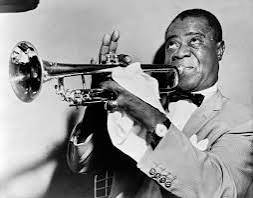Louis Armstrong, often referred to as Satchmo or Pops, was born on August 4, 1901, in New Orleans, Louisiana, and became one of the most influential figures in jazz music history. Known for his charismatic stage presence, distinctive gravelly voice, and virtuosic trumpet playing, Armstrong's impact on the development of jazz and popular music is immeasurable.
Raised in poverty in New Orleans' rough neighborhoods, Armstrong found solace in music at an early age. He learned to play the cornet in a reform school for troubled boys and began performing in local clubs and on riverboats. His talent caught the attention of Joe "King" Oliver, a prominent cornet player in New Orleans, who became his mentor.
Armstrong's career took off in the 1920s when he moved to Chicago and joined King Oliver's Creole Jazz Band. His innovative improvisational skills and ability to blend blues and ragtime influences with jazz set him apart from his contemporaries. Armstrong's recordings with the Hot Five and Hot Seven groups during this period, including classics like "West End Blues" and "Potato Head Blues," showcased his technical brilliance and musical inventiveness.
In the 1930s and 1940s, Louis Armstrong achieved international fame as a solo artist and band leader, touring extensively and recording hit songs such as "Stardust," "Hello, Dolly!," and "What a Wonderful World." His gravelly voice and warm, emotive delivery made him a beloved entertainer, transcending racial barriers and earning him widespread acclaim.
Beyond his musical contributions, Armstrong's infectious personality and goodwill endeared him to audiences worldwide. He became a cultural ambassador for jazz, touring extensively in Europe, Africa, and Asia, and collaborating with artists from different musical genres. His friendship with Ella Fitzgerald and recordings with Duke Ellington further solidified his legacy as a pioneering force in American music.
Louis Armstrong's influence extended beyond his lifetime. He was instrumental in popularizing jazz as a distinct art form and influencing generations of musicians, from trumpet players like Miles Davis to vocalists such as Frank Sinatra. His recordings continue to be celebrated for their technical mastery, emotional depth, and enduring appeal.
Throughout his career, Armstrong received numerous accolades, including induction into the Grammy Hall of Fame and the Rock and Roll Hall of Fame. His impact on music and culture was recognized with the Presidential Medal of Freedom in 1969, cementing his status as a national and international treasure.
In summary, Louis Armstrong's contributions to jazz and popular music are unparalleled. His innovative spirit, technical prowess, and infectious charisma left an indelible mark on the world of music, inspiring generations and ensuring his place as one of the greatest musicians of the 20th century.



No comments yet
Be the first to share your thoughts!